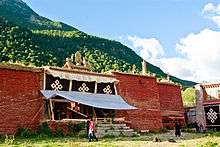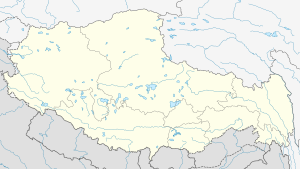Reting Monastery
Reting Monastery (Wylie: rwa sgreng gom pa ) is an historically important Buddhist monastery in Lhünzhub County in Lhasa, Ü-Tsang, Tibet. It is also commonly spelled "Radreng."[1]
| Reting | |
|---|---|
 | |
| Religion | |
| Affiliation | Tibetan Buddhism |
| Sect | Gelug (formerly Kadam) |
| Location | |
| Location | Reting Tsampo Valley, north of Lhasa, Lhünzhub County |
| Country | China |
 Shown within Tibet | |
| Geographic coordinates | 30°18′36″N 91°30′47″E |
| Architecture | |
| Founder | Dromtön |
.jpg)

| Part of a series on |
| Tibetan Buddhism |
|---|
 |
|
|
|
Practices and attainment |
|
Institutional roles |
|
History and overview |
History
Reting Monastery was founded by Atiśa's chief disciple Dromtön in 1057 in the Reting Tsangpo Valley north of Lhasa as the seat of the Kadam lineage of Tibetan Buddhism. He brought some of Atiśa's relics with him.[2][3] It was the first major monastery of the Sarma revival.
Je Tsongkhapa (1357–1419) reformed the Kadam, which then became known as the Gelug lineage and Reting became an important Gelug monastery, the seat of the Reting Rinpoche.[4]
The Reting Rinpoches were responsible for the successful search and discovery of the 14th Dalai Lama. The Reting Rinpoches were among the candidates for Regent during the minority of a Dalai Lama. Thus, the Reting Rinpoche was Regent between 1845 and 1855 and, again, from 1933-1947. The latter Regent, the Fifth Reting Rinpoche, was involved in the search for the present Dalai Lama and became his Senior Tutor, later abdicated his position and was found guilty of colluding with the Chinese and died in a Tibetan prison in 1947. In fact his Shugdenpa accusers who were in power are generally held responsible for his murder were colluding with the Chinese Ambon. They also destroyed the Gelug Reting Monastery and killed many in Lhasa.[5][6] The political confusion which followed aided the rapid collapse of Tibet after the Chinese invaded.[4]
The Sixth Reting Rinpoche died in 1997. The Chinese announced in January 2001 that a new incarnation had been chosen as the Seventh Reting Rinpoche, just two days after the Karmapa began his flight to India. This incarnation has not been recognised by the Dalai Lama who believes he is a pawn in the attempt by the Chinese to control the Buddhist religion in Tibet.[5]
Reting was devastated by the Red Guards during the Cultural Revolution, and has only been partially restored.[5]
Footnotes
- Grayb Tuttle, Kurtis R. Schaeffer, The Tibetan History Reader, Columbia University Press, 2013, p. 712 (Index): "Radreng (Reting, Gelukpa monastery northeast of Lhasa), Rwa sgreng)."
- Dowman, Keith. (1988). The Power-Places of Central Tibet: The Pilgrim's Guide, pp. 91-95. Routledge & Kegan Paul, London. ISBN 0-7102-1370-0.
- McCue, Gary. Trekking in Tibet: A Traveler's Guide. The Mountaineers Books, 1999
- Dowman, Keith. (1988). The Power-Places of Central Tibet: The Pilgrim's Guide, p. 94. Routledge & Kegan Paul, London. ISBN 0-7102-1370-0.
- Mayhew, Bradley and Kohn, Michael (2005). Tibet, 6th Edition, (2005), p. 142, Lonely Planet Publications. ISBN 1-74059-523-8.
- "Biography of Reting Rinpoche."
References
| Wikimedia Commons has media related to Reting monastery. |
- Goldstein, Melvyn C. A History of Modern Tibet, 1913-1951: The Demise of the Lamaist State. University of California Press: 1991.